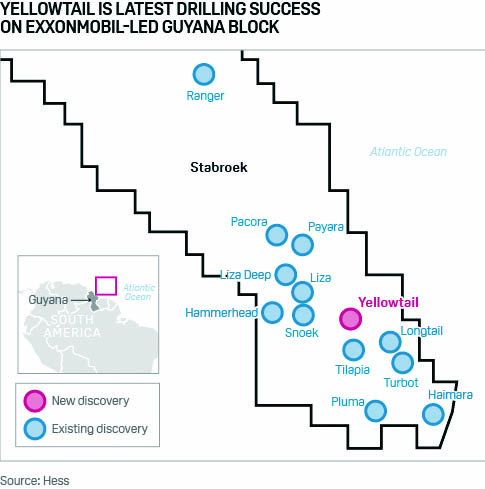Civil society group, Article 13 yesterday called on the government to release the production licence for the Yellowtail well development and expressed consternation at the speed with which approval had come and the studies that still need to be done.
Article 13 said that the issue of the production licence to ExxonMobil subsidiary, Esso Exploration and Production Guyana Limited (EEPGL) followed the granting two days earlier of an Environmental Permit issued by the Environmental Protection Agency (EPA).
“In what at best was a well-coordinated and orchestrated exercise, Alistair Routledge, President of Esso, signed as agreeing the terms and conditions of the Permit on the very same day”, the group noted.
Article 13 said that technical staff of the Ministry of Natural Resources were then able to review and evaluate the 41-page Permit, including such terms and conditions as the EPA, in its wisdom considered necessary, to insert those and other such other conditions the Ministry saw as vital and to draw up the Production Licence for signature by Minister Vickram Bharrat, all in less than 48 hours.
“Of course, the Ministry had the benefit of the conflicted Joslyn McKenzie and Ms. Pradeepa Bholanath, both of whom are employed by the Ministry of Natural Resources, the former as the Permanent Secretary and the latter as Senior Director for Climate and REDD+ (Reducing Emissions from Deforestation and Forest Degradation). These individuals, along with Dr. Garvin Cummings, Agriculture Ministry’s Chief Hydrometeorological Officer, make up the Environment Assessment Board.
“What stands out in this whole sordid business is not only that the Environmental Protection Agency, the Environment Assessment Board and the Ministry of Natural Resources are unable to exercise independent judgement among themselves but that the Government seems willing to act in accordance with the dictates of the oil companies. Mindful of the law’s requirements for relinquishment of blocks, the oil companies must be only too pleased that the Government has delegated to them the determination of the country’s depletion policy!”, Article 13 declared.
The group said that the Environmental Assessment Board – which presides over appeals of EPA decisions – itself took a matter of days to review the revised impact assessment report following representations made by environmental experts and other members of the public on what they considered to be a procedurally and technically flawed impact study used by the oil companies for the grant of the production licence.
“Such a licence is granted by the Minister and must include the conditions necessary to give effect to the petroleum agreement held by the oil companies and the conditions subject to which the licence is granted.
While it is not an express requirement of the law, Article 13 calls on the Government to publish the licence not only in the cause of transparency and accountability, but also so that the environmentalists and the public can play their role in monitoring the operation of the licence which is good for twenty years in the first instance and a renewal period of ten years”, the group added.
It called upon the Government not to commit the errors of the APNU+AFC Government which hid the information on the “signing bonus” and the 2016 Agreement until the pressure became intense and which suggested that the interest of current and future generations of Guyana is less important than the oil companies.
Article 13 said it defers to the civil society organisations and individuals with specialist knowledge and expertise in environmental matters but was no less astounded to note that the so-called Permit itself requires a whole new set of studies, including the following:
1. An updated targeted marine environmental baseline study;
2. Benthic Habitat and Fauna Study;
3. Sediment Quality Study;
4. Marine Water Quality Study;
5. Fisheries Stock Assessment and Impacts;
6. Ecosystems Services and Dependencies; and
7. Any other baseline environmental or social study as may be determined by the Agency.
Article 13 said in this regard, the oil companies are required to submit to the Agency for approval, a Terms of Reference (TOR) for the conduct of each of the above studies which then leads to further steps, reviews and action.
“Article 13 wonders why these are only now being sought given that the first production licence was issued years ago and all these wells constitute the single Stabroek Block. We are advised that the law requires that these studies should have been carried out and their results form part of any application. We therefore consider these belated requirements farcical, meaningless and disingenuous. Is there any Guyanese naïve enough to believe that if these studies prove to be adverse and substantial, that the Permit and the Production Licence will be withdrawn?”, the group questioned.
Article 13, which recently had a meeting with a visiting senior US official, said that Guyanese have a right to access information in the petroleum licence.
“But more than that: we cannot substitute expediency and submissiveness to Esso for competent management of the country’s natural and non-renewable resources”, it declared.



